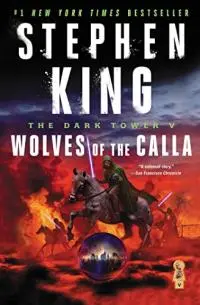Stephen King hasn’t written too many prominent female characters since he burst onto the scene with his debut novel Carrie in 1974. Since then he’s had maybe a handful of novels with female protagonists as the lead. Those would include Cujo, Gerald’s Game, Dolores Claiborne, Lisey’s Story and a few others. His dozens of novels have been more concerned with the male experience, which is perfectly understandable as he is a man, and his main characters haven’t always strayed that far from King himself, with many writer characters starring in his books. So while he’s had a few female protagonists, and certainly several co-leads and women supporting characters, very few of his novels have been about female concerns. For that very reason, the fifth book in The Dark Tower series, Wolves of the Calla, stands out.
The Dark Tower series itself is very low on female characters. There’s, of course, Susan Delgado who plays prominently in Wizard and Glass as Roland’s lost teenage love. But her purpose there is basically to be fridged, as in to die to provide motivation for a male character. The better argument can be made for Susannah Dean, the woman whose body is initially shared by the twin personalities of Odetta Holmes and Detta Walker. She is a nuanced and multifaceted character, but even she is problematic. Setting aside the racial landmine that King doesn’t quite successfully navigate, her role in the series is to be the mother of a monster. She’s emblematic of King’s struggle to escape the Madonna/Whore binary that’s so prevalent in fiction.
But that all changes in Wolves of the Calla. In the fifth book in the series, Roland and his Ka-tet arrive in a frontier town that needs defending from “Wolves,” strange beings on horseback that arrive once a generation to steal half the town’s population of children. With little in the way of weapons or people willing to volunteer as fighters, Roland discovers unlikely allies in the Sisters of Oriza. What appear to be normal housewives on the outside turn out to be warriors in a long tradition.
This goes back to the legend of Lady Oriza, a young noblewoman whose father, Lord Grenfall, is murdered by an outlaw prince named Gray Dick. In order to exact her revenge, she invites Gray Dick to dinner. He’s hesitant at first, but she promises him that they will both be naked so neither will be able to conceal a weapon. He agrees on those terms, not aware that she has sharpened one edge of her dinner plate, using the other edge as a grip, and endlessly practiced to throw it with precision. If the nature of the metaphor isn’t apparent at that point, Oriza flings the plate and beheads the man, effectively castrating Gray Dick.
As a result, the Sisters of Oriza fling the plate, screaming out their patron saint’s name. In fact, the very first Wolf that is killed, generations earlier, is by a woman, one of the few townspeople brave enough to stand up to the invaders. The fact that the Wolves are secretly robots and have a weak spot on the top of their heads, ties them thematically to the story of Gray Dick.
Susannah consequently takes up the dish as well in the face of limited firearms. It’s almost like she was destined to throw the plate, as she excels with very little practice. And this is important, as it sets her apart from her fellow gunslingers. She’s more comfortable with a weapon that is specifically coded to be used by women, as opposed to the gun that is unmistakably phallic.
It’s no coincidence that King frames gunslingers as having only ever been boys and men. Although the books don’t particularly shine a magnifying glass on this, the Marvel comic book adaptation does make it a point to have a girl gunslinger apprentice, Aileen Ritter, in Roland’s youth. She stands apart by uniquely saying, “She who shoots with her hand has forgotten the face of her mother,” switching out the traditional father.
This is the dichotomy of Susannah in Wolves of the Calla, as she is a gunslinger but she is also a woman and at the whim of her pregnancy. A product of her being raped in The Waste Lands by a demon, another unfortunate trope used in relation to female characters, for a good chunk of the book she is robbed of any agency by the demon Mia, who takes over her body at times, mostly at night, to feed “the chap.” The chap is Mordred, a monstrous fetus that goes on to be an important plot point in the last two books. Here it is a ticking time bomb that could go off at any moment. What’s problematic about the pregnancy is how Susannah is mostly in denial about it and oblivious to Mia’s presence, but the men of her Ka-tet, Roland, her husband Eddie and Jake, know about both and discuss what to do about it behind her back.
This culminates in a scene in which Roland, Susannah’s “dinh,” meaning father in the High Speech of gunslingers, asks the priest Father Callahan advice on how to proceed with the pregnancy. This is a complex scene, because on the one hand Roland is obviously pro-choice. He wants to abort the baby due to the possibility that Susannah may be in danger. Callahan, a Catholic, is aghast at the idea and immediately turns on Roland, threatening to do everything in his power to stop the operation. He says he would even turn the entire town against Roland, a threat that baffles the gunslinger. Callahan would risk the lives of all the children in town just to save one demon child? But Callahan will not relent.
Then the following exchange happens:
“Your man Jesus seems to me a bit of a son of a bitch when it comes to women,” Roland said. “Was He ever married?”
The corners of Callahan's mouth quirked. “No,” he said, “but His girlfriend was a whore.”
“Well,” Roland said, “that's a start.”
 It must be said that Roland isn’t Christian, although he’s aware of a version of the religion that has made its way to Mid-World. If he believes in anything it’s in a form of predeterminism based around Ka, a kind of combination of fate and providence. So he’s not bound by dogma like Callahan. He's shown to be very open minded when it comes to women in relation to such subjects as sex and positions of power, as in the case of Aunt Talitha, the leader of River Crossing in The Waste Lands. But even with all of that said, the sad fact is that Susannah’s pregnancy is continuously discussed by men. First by Roland, Eddie and Jake, then by Roland and Callahan, they believe themselves in a position to determine what can and can’t be done with her body.
It must be said that Roland isn’t Christian, although he’s aware of a version of the religion that has made its way to Mid-World. If he believes in anything it’s in a form of predeterminism based around Ka, a kind of combination of fate and providence. So he’s not bound by dogma like Callahan. He's shown to be very open minded when it comes to women in relation to such subjects as sex and positions of power, as in the case of Aunt Talitha, the leader of River Crossing in The Waste Lands. But even with all of that said, the sad fact is that Susannah’s pregnancy is continuously discussed by men. First by Roland, Eddie and Jake, then by Roland and Callahan, they believe themselves in a position to determine what can and can’t be done with her body.
Ultimately, however, they do sit down and “palaver,” discuss, with Susannah what should be done. Everything is put out in the open, and they formulate a plan of how to deal with Mia. But how Susannah regains control of her body is ironically her agreeing to give the steering wheel over to Mia. She goes into her own head and negotiates with Mia, saying that as long as Mia allows Susannah to stay for the duration of the battle against the Wolves, she’ll agree to let Mia take over and lead them to the followers of the Crimson King, who wants to bring down the Tower and use Mordred to do so, in order to give birth.
And within this situation, Mia is framed as all the most negative aspects of motherhood. Her name literally means mother, and she has no identity outside of wanting to take care of Mordred. She lies and cheats to get what she wants, and in the following book, Song of Susannah, gradually accepts less and less from her captors. Initially she was told she would raise Mordred throughout his entire childhood, but it becomes apparent they plan to discard her as quickly as possible. This proves to be sooner than even they suspected, as her first attempt at breastfeeding Mordred results in the little beast eating her alive.
Stephen King obviously gravitates toward writing men more than he does women, but that doesn’t mean he can’t write strong, empowered women. It’s especially clear that between the release of Susannah’s introduction in The Drawing of the Three in 1987 and Wolves of the Calla in 2003 King decided that women were vitally important to the story of the Dark Tower. Their strength and fearlessness are what turn the tide in the battle against the Crimson King. Wolves of the Calla is the moment when Roland learns how to ultimately save the Tower. It’s also when Susannah comes of her own as a character, becoming more than just Eddie’s wife and the mother of an unborn baby.
It’s not a perfectly feminist tale, as exemplified by a cast of male characters debating about what to do with Susannah. But as Roland would say, it’s a start.
Get Wolves of the Calla at Bookshop or Amazon

About the author
A professor once told Bart Bishop that all literature is about "sex, death and religion," tainting his mind forever. A Master's in English later, he teaches college writing and tells his students the same thing, constantly, much to their chagrin. He’s also edited two published novels and loves overthinking movies, books, the theater and fiction in all forms at such varied spots as CHUD, Bleeding Cool, CityBeat and Cincinnati Magazine. He lives in Cincinnati, Ohio with his wife and daughter.








